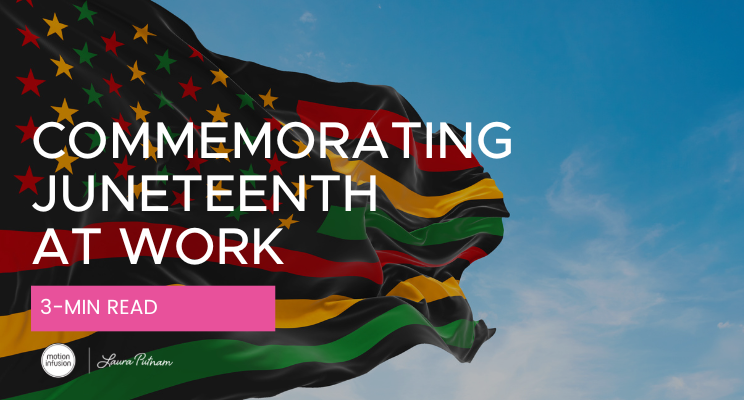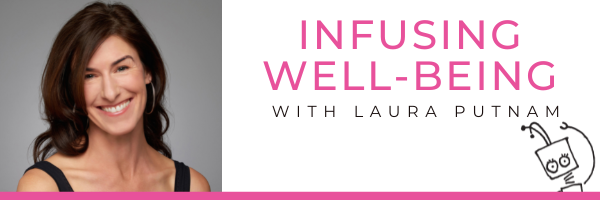|
Juneteenth, the recently established (but long overdue) federal holiday commemorating the end of slavery, is a reminder of the progress we have made as well as the work that is still to be done. What’s one thing you might do in the workplace to mark this important holiday? Engage in peer-to-peer conversations with your coworkers. Chipping away at systemic racism begins with talking about it – which can be daunting for many, especially if you’re a manager. To make it a little less daunting, here are some suggestions. 1. Carve out a “Safe Harbor” within your team. You need to start with creating psychological safety, aka, a "Safe Harbor," and a surprisingly effective way to do so is through walking meetings. (Note: Walking meetings are still possible even if your team is now virtually connected. Just swap out the Zoom link for a conference call.) Moving while we meet changes up the usual dynamics. Instead of staring down one another across a table or desk, you’re walking side by side, looking ahead. Just that repositioning can help to loosen up the hierarchy (and not to mention stiffness) stranglehold. But it’s more than that. Movement actually primes our brains to connect more, through a release of neurotransmitters that make us feel more at ease with one another. Movement helps to support the key elements that engender more psychological safety within a team, which include (a) ensuring that airtime gets equally shared amongst team members, and (b) tuning into one another more and paying attention to social cues. 2. Download the Wellness Privilege at Work Toolkit After building a foundation of psychological safety, you can start to get more honest. That is, you can start, as a team, to begin making the invisible visible. The truth is that those individuals who hold privilege, or in this case, "Wellness Privilege," might not even be aware that they do. For example, they might not see that they are given more airtime and that they are rarely interrupted or ignored, compared with others. They might not see that they are always credited for their ideas (whereas others aren't). They might not see that they are given a wide runway to come to work as their full authentic selves, and that others are feeling pressured to "co-switch" and hide aspects of their identity. This is where a tool like our Wellness Privilege at Work Checklist can be helpful. This checklist, created in partnership with DEI expert Karen Catlin, is designed to (a) make the invisible visible, (b) spark conversation, and (c) inspire meaningful action, such as allyship, activated managers and leaders, and ultimately, structural changes in the organization, such as establishment of Juneteenth as a paid holiday or pay equity audits to identify whether or not there are race pay gaps (or gender pay gaps). For more about how Wellness Privilege manifests in the workplace and how it ties to larger equity issues, take a look at a terrific article that published yesterday in Las Cruces Sun Newspaper about a new paid leave requirement in New Mexico. 3. Conduct a “Safe Harbor” conversation. Now that you have created more safety within your team and have helped to make the invisible visible by having everyone take the Wellness Privilege at Work Checklist, the conversation can begin. This works especially well team by team. You might begin with watching the video Story of Access. Then, follow up with some open-ended questions. Here are some you might try:
While this might feel intimidating (especially if you're the one leading the conversation), maybe it will be easier than you might think. Take one manager at a leading health insurance provider who led her team in a "Safe Harbor" Conversation. “In talking about race relations," she noted, "I think we’re all nervous. We don’t want to say the wrong thing. But saying nothing implies we don’t care.” But, coming prepared (with a list of these questions), made it easier. “I expected crickets, but the team had a lot to say. We only made it through two questions and had a long discussion on making our workplace more welcoming to those who don’t look or think exactly like us. These weren’t easy conversations—and I hope they’re not over. But, I believe each one of us is an agent of change and will respectfully navigate conversations in our homes and friend groups.” Change is possible. Small efforts, practiced consistently, do add up over time. Juneteenth provides an opportunity to not only have a one-time conversation, but an ongoing one. These conversations can help to break down systemic racism – and at the same time, create more awareness, more connection and more engagement within your team.
0 Comments
Leave a Reply. |
Follow laura on social:Website by Brand Genie
|
join laura's monthly newsletter
|




